
Tin Machine were a British–American rock band formed in 1988, and fronted by English singer-songwriter David Bowie. The band consisted of Bowie on lead vocals, saxophone and guitar; Reeves Gabrels on guitar and vocals; Tony Fox Sales on bass and vocals; and Hunt Sales on drums and vocals. The Sales brothers had previously performed with Bowie and Iggy Pop during the 1977 tour for The Idiot. Kevin Armstrong played additional guitar and keyboards on the band's first and second studio albums and first tour, and American guitarist Eric Schermerhorn played on the second tour and live album Tin Machine Live: Oy Vey, Baby (1992).

Tin Machine is the debut studio album by Anglo-American hard rock band Tin Machine, released on 22 May 1989 through EMI America Records. The band consisted of English singer-songwriter David Bowie, American guitarist Reeves Gabrels and brothers Tony Fox and Hunt Sales on bass and drums, respectively, while Englishman Kevin Armstrong acted as an additional guitarist. The project was spearheaded by Bowie, who felt disconnected in his career by 1987 and looked to reinvent himself. After meeting Gabrels through his Glass Spider Tour, the two agreed to work together and would collaborate frequently for the next decade. Bowie hired the Sales brothers, neither of whom he had worked with since the 1970s, after a meeting in Los Angeles, while English producer Tim Palmer was hired to co-produce.

Tin Machine II is the second and final studio album by Anglo-American rock group Tin Machine, released on 2 September 1991 through Victory Music in association with London Records. The band, composed of English singer-songwriter David Bowie, Reeves Gabrels on guitar and brothers Tony Fox and Hunt Sales on bass and drums, respectively, recorded it in Sydney, Australia in late 1989 at the conclusion of the Tin Machine Tour. After Bowie completed his solo Sound+Vision Tour in late 1990, recording resumed in Los Angeles, California until March 1991. The production was handled by Tin Machine and Tim Palmer, who produced their debut studio album (1989), with additional production by Hugh Padgham on "One Shot". While the album musically retains a hard rock sound, the songs are more melodic compared to its predecessor, with lyrics focusing on love.

"The Hearts Filthy Lesson" is a song by David Bowie, from his 1995 album Outside, and issued as a single ahead of the album. It showcased Bowie's new, industrial-influenced sound. Lyrically, the single connects with the rest of the album, with Bowie offering a lament to "tyrannical futurist" Ramona A. Stone, a theme continued in subsequent songs. The song is also meant to confront Bowie's own perceptions about the ritual creation and degradation of art. It appears in the end credits of the 1995 film Seven.

Tin Machine Live: Oy Vey, Baby is a live album by Anglo-American rock band Tin Machine, originally released through London Records on 2 July 1992. The album includes songs, all from the band's two albums, recorded between 20 November 1991 and 11 February 1992 from five different venues on the North American and Asian legs of Tin Machine's It's My Life Tour. The maligned album title was intended as a pun on U2's 1991 album Achtung Baby. Oy Vey, Baby has received negative reviews, with many criticising the performances. It failed to chart in both the UK and the US. It was accompanied by a concert video of the same title, which was filmed at The Docks, Hamburg on 24 October 1991. Following its release, Tin Machine disbanded and Bowie quickly resumed his solo career with Black Tie White Noise (1993).
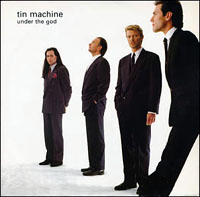
"Under the God" is the first official single released by Anglo-American hard rock band Tin Machine, taken from their eponymous debut album in June 1989.

"Tin Machine" is a song by Anglo-American hard rock band Tin Machine, and the song from which they took their name, a track from their debut album, also of the same name. It was released as a single in September 1989, as a double A-side with a live cover of Bob Dylan’s “Maggie's Farm”.
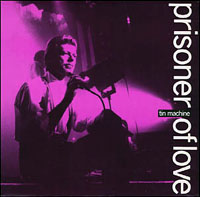
"Prisoner of Love" is a song by Tin Machine taken from their eponymous debut album. It was issued as their third single in October 1989.
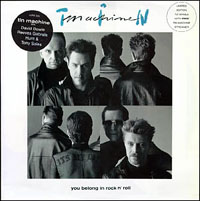
"You Belong in Rock n' Roll" is a song by Anglo-American hard rock band Tin Machine, released ahead of their second album in August 1991. The song was the band’s first release on Victory Records, which was distributed by London Records in the UK.

"Baby Universal" is a song by Anglo-American hard rock band Tin Machine, released as the second single from their Tin Machine II album in October 1991.
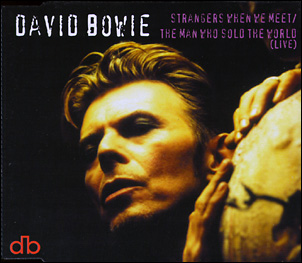
"Strangers When We Meet" is a song by David Bowie, originally recorded for his 1993 album The Buddha of Suburbia. In 1995, Bowie re-recorded the song for his Outside album, and this version was edited and released as the second single from the album, paired with a reworked version of Bowie's 1970 song "The Man Who Sold the World".

"Look Back in Anger" is a song written by English artists David Bowie and Brian Eno for the album Lodger (1979). It concerns "a tatty 'Angel of Death'", and features a guitar solo by Carlos Alomar.

"Hallo Spaceboy" is a song by David Bowie from his 1995 album Outside, and the third and final single from the album. The track was re-recorded in 1996 and issued as a remix featuring Pet Shop Boys as guest artists. Bowie and Brian Eno co-wrote the original album version of the song.
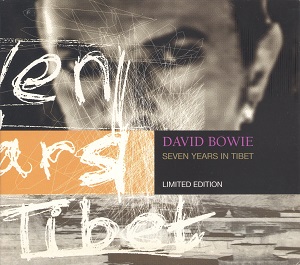
"Seven Years in Tibet" is a song and single by English musician David Bowie and Reeves Gabrels from the 1997 album, Earthling. In some territories, a version of the song sung by Bowie in Mandarin Chinese was released as "A Fleeting Moment".

"Thursday's Child" is a song recorded by David Bowie for his twenty-second studio album Hours (1999). Written by Bowie and Reeves Gabrels, the song was released as the album's lead single on 20 September 1999, by Virgin Records.

LiveAndWell.com is a 1999 limited edition live album by David Bowie. It was not available commercially and could only be acquired by being subscribed to BowieNet at the time. The album is made up of recordings from the 1997 Earthling Tour, featuring songs from the albums 1. Outside (1995) and Earthling (1997)
The Hours Tour was a small-scale promotional concert tour by David Bowie comprising a handful of live performances and numerous television appearances in support of the album Hours in late 1999. Several live songs from the tour were included as b-sides to singles from the album, and concert recordings from the tour were released in 2020 as Something in the Air and in 2021 with David Bowie At The Kit Kat Klub .

The It's My Life Tour was a concert tour headlined by Anglo-American hard rock band Tin Machine. The tour commenced on 5 October 1991 after two warm-up shows, one press show and three trade-industry shows, visiting twelve countries and concluding after seven months and sixty-nine performances, a larger outing than their first tour in 1989.

VH1 Storytellers is a live album by David Bowie. It was released on 6 July 2009 and features a 23 August 1999 performance on Storytellers, a VH1 program.
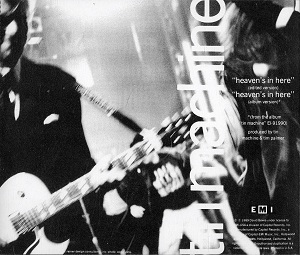
"Heaven's in Here" is the lead track from the eponymous debut album by the Anglo-American hard rock band Tin Machine. Written by David Bowie, it was released as a promotional lead single from the album in 1989.


















